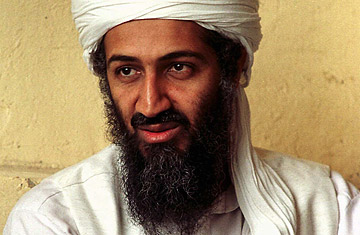
Osama bin Laden in Afghanistan, in an April 1998 file photo
(5 of 6)
Back home, members of the bin Laden family were becoming increasingly anxious with the company Osama was keeping. With the encouragement of the Saudi government, relatives made visit after visit to Sudan to encourage bin Laden to break his ties to the militants. The family patriarch, Mohammed's brother Abdullah, then in his 80s, told bin Laden, "Son, you are destroying everything I built with your father. Finish it. It's enough." When bin Laden refused to accept the advice, the family in 1994 placed advertisements in Saudi newspapers disowning him, and the Saudi government took the unprecedented step of stripping him of his citizenship. Again, Khashoggi relates, bin Laden, who saw himself as a national hero and a defender of the faith, was outraged.
Retaliation was swift. Bin Laden announced that he and other Saudi dissidents had established an opposition group called the Advice and Reformation Committee. Its first communiqué was a rant against the government for taking away his citizenship. For the first time, bin Laden was making his beef with the Saudi regime personal. He wrote an open letter to King Fahd bin Abdulaziz al Saud saying that he had "lost all legitimacy" and that Saudis were obligated to revolt against him.
If relations with his homeland were complicated, life in Sudan was not always smooth sailing either. In February 1994, for reasons that are unclear, three gunmen, having first mowed down a group of Friday worshippers at a mosque, drove to bin Laden's place in Khartoum and sprayed his guesthouse with bullets. In the ensuing gunfight, according to local residents, two of the radicals, members of the extreme Takfir wa al-Hijrah group, were killed, as were four of bin Laden's men. After the attack, Issam al-Turabi says, bin Laden became more withdrawn. He stopped riding and dug trenches at either end of his street to restrict access.
The next year, bin Laden's exile status cost him the company of his beloved eldest son, Abdullah. Al-Turabi recalls that bin Laden used to call the boy "Sheik" out of adoration. In October 2001, Abdullah told a Saudi newspaper that when he turned 17, his father finally gave him the permission he had repeatedly sought to return to Saudi Arabia to marry a relative. Abdullah swore his allegiance to the Saudi regime, began working in the family company and said he had not been in contact with his father since leaving Sudan.
Bin Laden still seemed to be enjoying life. When Khashoggi saw him on a visit to Khartoum in 1995, he found that the exiled radical had mellowed: "He was involved in farming. He would take you around to see his farms. He began to lose interest in jihad. He started to get gray hair in his beard. I sensed so much change in him. We spent so much time talking about the economy, agriculture; about how Muslims can achieve the goal of a strong state through other means than jihad. That was a new sign for him."
Khashoggi says bin Laden even promised him an interview in which he would renounce the use of violence against the Saudi regime in order to pave his way back home. As they discussed the deal one night over dinner, Khashoggi recalls, a group of bin Laden's Egyptian associates hovered in the shadows. "They wouldn't sit with us," he says. "They wouldn't eat with us." Instead they would summon bin Laden occasionally to consult with them. After putting off the interview for three days in a row, bin Laden reneged.
The time for second chances had run out. In 1995 the U.S. received the first hint that bin Laden might have provided help, including housing, to the ringleader of the 1993 World Trade Center attack. That same year, Egyptian President Hosni Mubarak narrowly escaped assassination in Ethiopia at the hands of an Egyptian terrorist group supported by bin Laden. In 1996 four Saudi nationals convicted of killing five Americans and two Indians in a truck bombing of a U.S. military training facility in Riyadh confessed that they had been inspired by bin Laden's ideas. However much he enjoyed his farming, he was now a wanted man. Under pressure from the U.S. and Egypt, Sudan asked bin Laden to go.
According to Sudanese officials, four men arrived at bin Laden's house and told him that he should think about leaving quickly because they could not be responsible for what would happen to him the next day. "He was very bitter when they asked him to go," says Issam al-Turabi. "He had the mentality of someone who was picked on. He became like a cornered cat."
Afghanistan was his corner. Bin Laden flew into Jalalabad by chartered plane with an entourage of lieutenants, wives and children. In Afghanistan he would take a fourth wife and sire his 20th child, a girl born on Sept. 15, 2001. He named his new daughter Safiyah, after the aunt of the Prophet Muhammad, because, he told Hamid Mir, "Safiyah killed Jews."
When bin Laden first arrived back in Afghanistan, Jalalabad's warlord, Younis Khalis, arranged for his family and about 15 other Arab families to stay in a network of caves in Tora Bora. Even for the ascetic bin Ladens, the complex, built by the mujahedin during the war with the Soviets, was too primitive. Bin Laden told Khalis there were "no facilities, only caves," and the warlord offered him a compound in Farm Hada, outside Jalalabad, that had indoor plumbing but no electricity.
